HEAL6010: Sustainability Analysis of the UK National Health System
VerifiedAdded on 2023/06/11
|21
|5689
|58
Report
AI Summary
This report assesses the sustainability of the United Kingdom's National Health Service (NHS) by examining internal, external, and other critical factors. It uses system performance indicators like equity, responsiveness, financial protection, and treatment outcomes to evaluate the NHS's viability. The analysis identifies key areas for improvement, including education reforms for healthcare professionals, enhanced support for the informal healthcare sector, and addressing the healthcare needs of an aging population. The report concludes with recommendations aimed at enhancing the NHS's ability to adapt to future challenges and maintain its position as a leading healthcare system.
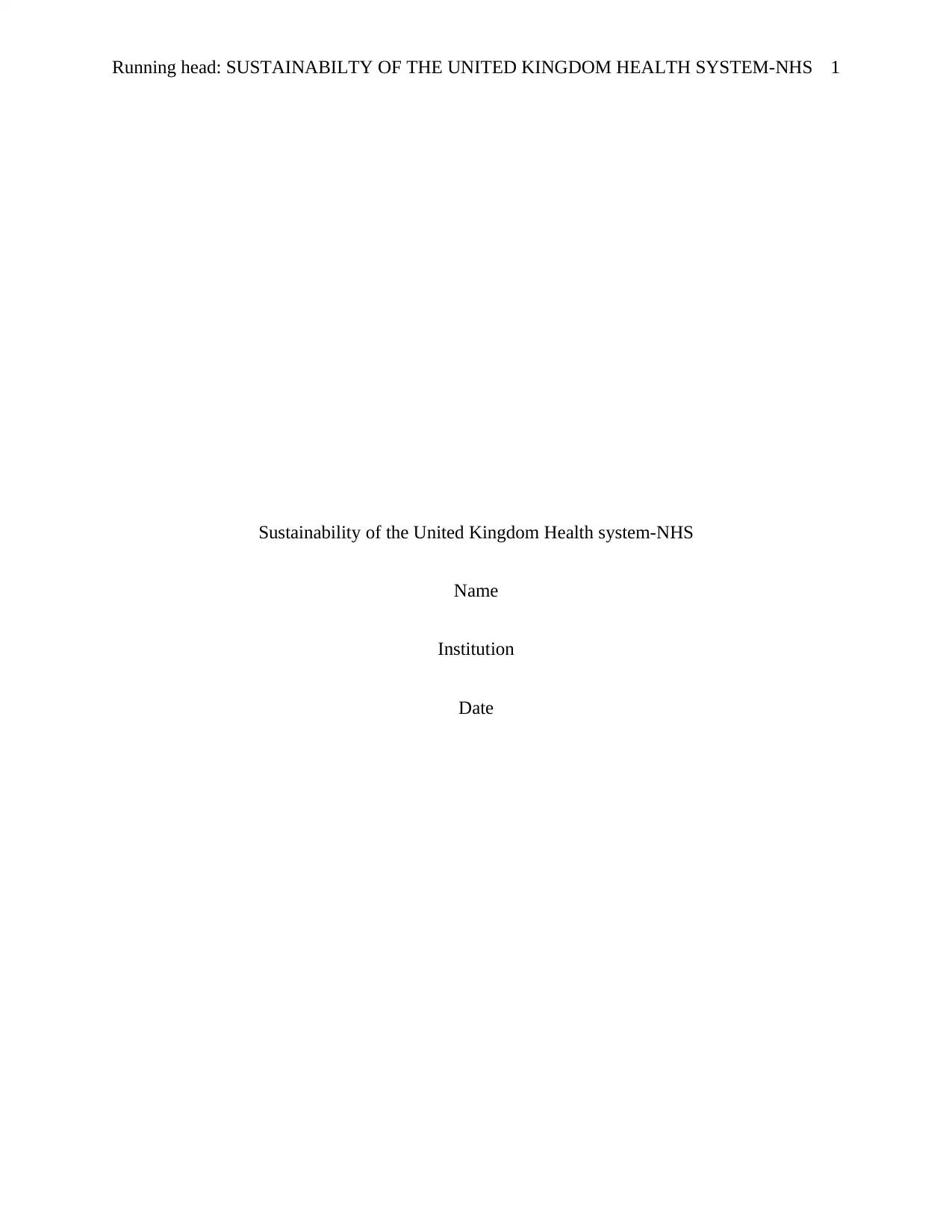
Running head: SUSTAINABILTY OF THE UNITED KINGDOM HEALTH SYSTEM-NHS 1
Sustainability of the United Kingdom Health system-NHS
Name
Institution
Date
Sustainability of the United Kingdom Health system-NHS
Name
Institution
Date
Paraphrase This Document
Need a fresh take? Get an instant paraphrase of this document with our AI Paraphraser
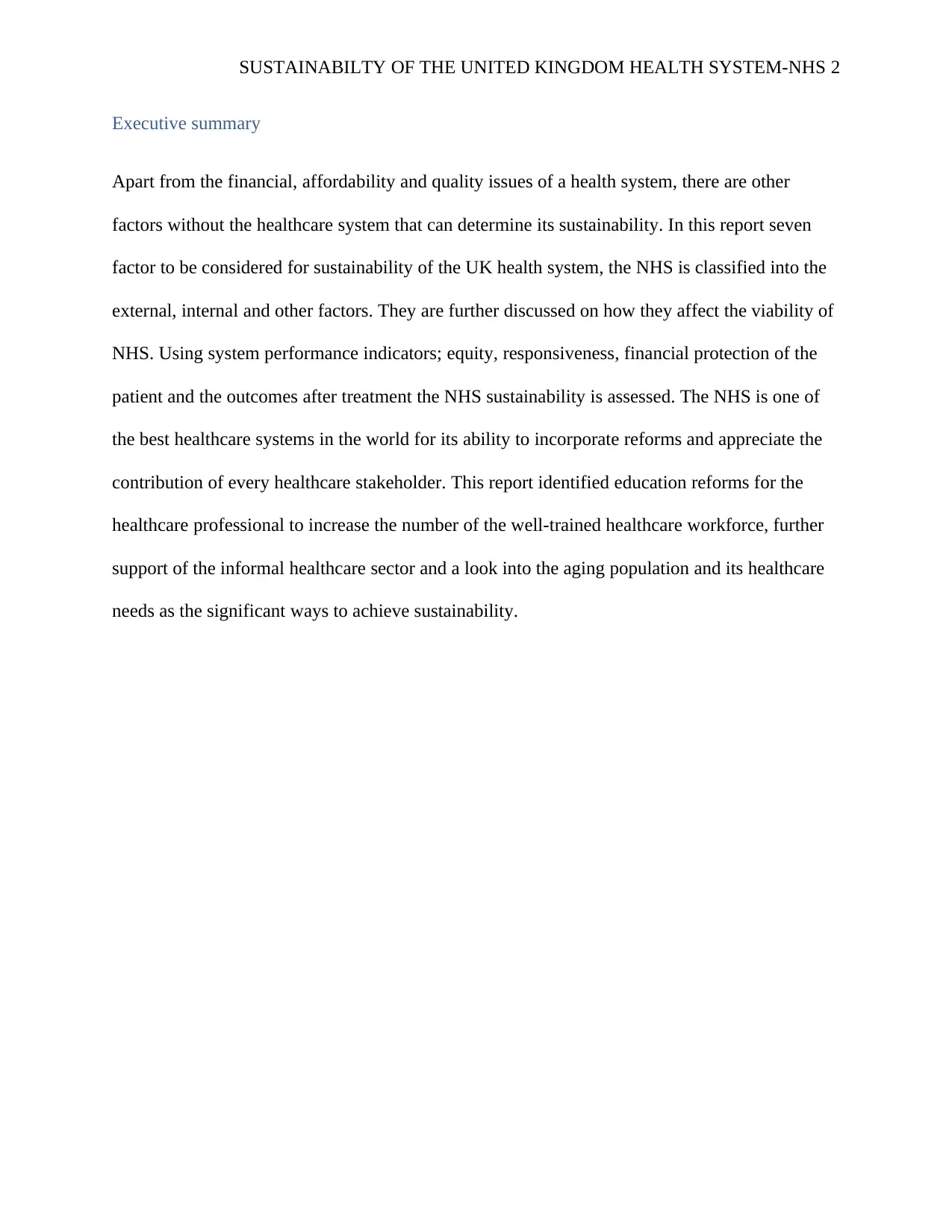
SUSTAINABILTY OF THE UNITED KINGDOM HEALTH SYSTEM-NHS 2
Executive summary
Apart from the financial, affordability and quality issues of a health system, there are other
factors without the healthcare system that can determine its sustainability. In this report seven
factor to be considered for sustainability of the UK health system, the NHS is classified into the
external, internal and other factors. They are further discussed on how they affect the viability of
NHS. Using system performance indicators; equity, responsiveness, financial protection of the
patient and the outcomes after treatment the NHS sustainability is assessed. The NHS is one of
the best healthcare systems in the world for its ability to incorporate reforms and appreciate the
contribution of every healthcare stakeholder. This report identified education reforms for the
healthcare professional to increase the number of the well-trained healthcare workforce, further
support of the informal healthcare sector and a look into the aging population and its healthcare
needs as the significant ways to achieve sustainability.
Executive summary
Apart from the financial, affordability and quality issues of a health system, there are other
factors without the healthcare system that can determine its sustainability. In this report seven
factor to be considered for sustainability of the UK health system, the NHS is classified into the
external, internal and other factors. They are further discussed on how they affect the viability of
NHS. Using system performance indicators; equity, responsiveness, financial protection of the
patient and the outcomes after treatment the NHS sustainability is assessed. The NHS is one of
the best healthcare systems in the world for its ability to incorporate reforms and appreciate the
contribution of every healthcare stakeholder. This report identified education reforms for the
healthcare professional to increase the number of the well-trained healthcare workforce, further
support of the informal healthcare sector and a look into the aging population and its healthcare
needs as the significant ways to achieve sustainability.
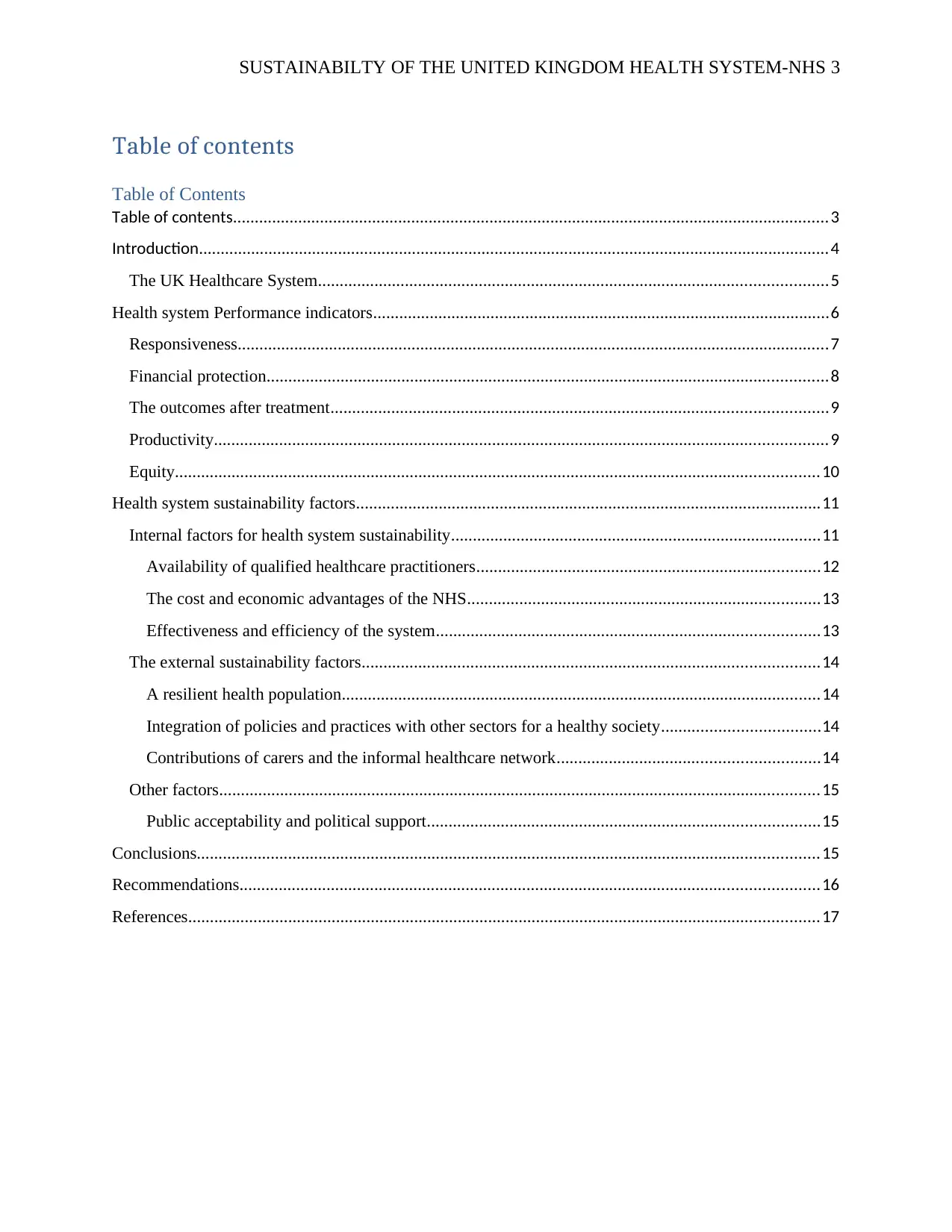
SUSTAINABILTY OF THE UNITED KINGDOM HEALTH SYSTEM-NHS 3
Table of contents
Table of Contents
Table of contents.........................................................................................................................................3
Introduction.................................................................................................................................................4
The UK Healthcare System.....................................................................................................................5
Health system Performance indicators.........................................................................................................6
Responsiveness........................................................................................................................................7
Financial protection.................................................................................................................................8
The outcomes after treatment..................................................................................................................9
Productivity.............................................................................................................................................9
Equity....................................................................................................................................................10
Health system sustainability factors...........................................................................................................11
Internal factors for health system sustainability.....................................................................................11
Availability of qualified healthcare practitioners...............................................................................12
The cost and economic advantages of the NHS.................................................................................13
Effectiveness and efficiency of the system........................................................................................13
The external sustainability factors.........................................................................................................14
A resilient health population..............................................................................................................14
Integration of policies and practices with other sectors for a healthy society....................................14
Contributions of carers and the informal healthcare network............................................................14
Other factors..........................................................................................................................................15
Public acceptability and political support..........................................................................................15
Conclusions...............................................................................................................................................15
Recommendations.....................................................................................................................................16
References.................................................................................................................................................17
Table of contents
Table of Contents
Table of contents.........................................................................................................................................3
Introduction.................................................................................................................................................4
The UK Healthcare System.....................................................................................................................5
Health system Performance indicators.........................................................................................................6
Responsiveness........................................................................................................................................7
Financial protection.................................................................................................................................8
The outcomes after treatment..................................................................................................................9
Productivity.............................................................................................................................................9
Equity....................................................................................................................................................10
Health system sustainability factors...........................................................................................................11
Internal factors for health system sustainability.....................................................................................11
Availability of qualified healthcare practitioners...............................................................................12
The cost and economic advantages of the NHS.................................................................................13
Effectiveness and efficiency of the system........................................................................................13
The external sustainability factors.........................................................................................................14
A resilient health population..............................................................................................................14
Integration of policies and practices with other sectors for a healthy society....................................14
Contributions of carers and the informal healthcare network............................................................14
Other factors..........................................................................................................................................15
Public acceptability and political support..........................................................................................15
Conclusions...............................................................................................................................................15
Recommendations.....................................................................................................................................16
References.................................................................................................................................................17
⊘ This is a preview!⊘
Do you want full access?
Subscribe today to unlock all pages.

Trusted by 1+ million students worldwide
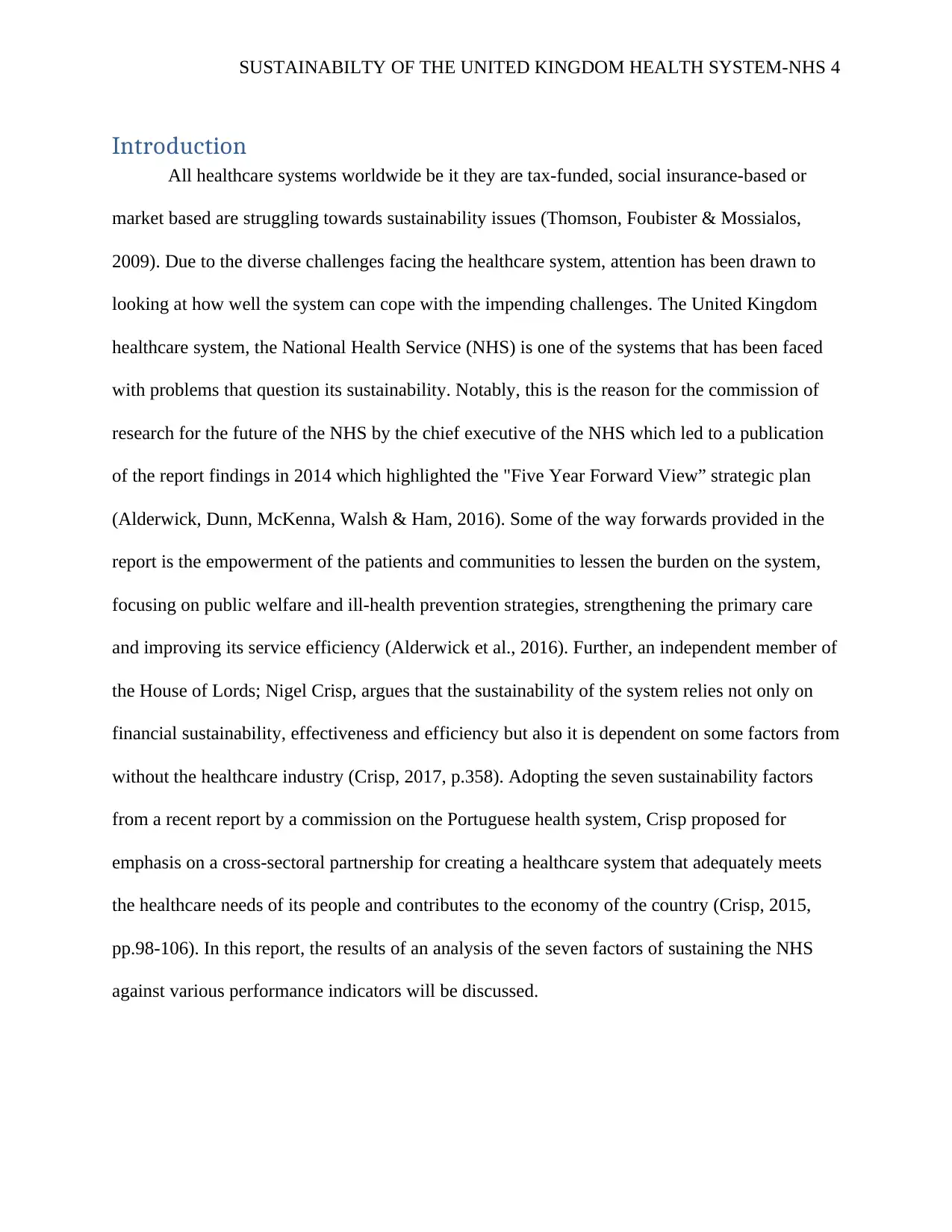
SUSTAINABILTY OF THE UNITED KINGDOM HEALTH SYSTEM-NHS 4
Introduction
All healthcare systems worldwide be it they are tax-funded, social insurance-based or
market based are struggling towards sustainability issues (Thomson, Foubister & Mossialos,
2009). Due to the diverse challenges facing the healthcare system, attention has been drawn to
looking at how well the system can cope with the impending challenges. The United Kingdom
healthcare system, the National Health Service (NHS) is one of the systems that has been faced
with problems that question its sustainability. Notably, this is the reason for the commission of
research for the future of the NHS by the chief executive of the NHS which led to a publication
of the report findings in 2014 which highlighted the "Five Year Forward View” strategic plan
(Alderwick, Dunn, McKenna, Walsh & Ham, 2016). Some of the way forwards provided in the
report is the empowerment of the patients and communities to lessen the burden on the system,
focusing on public welfare and ill-health prevention strategies, strengthening the primary care
and improving its service efficiency (Alderwick et al., 2016). Further, an independent member of
the House of Lords; Nigel Crisp, argues that the sustainability of the system relies not only on
financial sustainability, effectiveness and efficiency but also it is dependent on some factors from
without the healthcare industry (Crisp, 2017, p.358). Adopting the seven sustainability factors
from a recent report by a commission on the Portuguese health system, Crisp proposed for
emphasis on a cross-sectoral partnership for creating a healthcare system that adequately meets
the healthcare needs of its people and contributes to the economy of the country (Crisp, 2015,
pp.98-106). In this report, the results of an analysis of the seven factors of sustaining the NHS
against various performance indicators will be discussed.
Introduction
All healthcare systems worldwide be it they are tax-funded, social insurance-based or
market based are struggling towards sustainability issues (Thomson, Foubister & Mossialos,
2009). Due to the diverse challenges facing the healthcare system, attention has been drawn to
looking at how well the system can cope with the impending challenges. The United Kingdom
healthcare system, the National Health Service (NHS) is one of the systems that has been faced
with problems that question its sustainability. Notably, this is the reason for the commission of
research for the future of the NHS by the chief executive of the NHS which led to a publication
of the report findings in 2014 which highlighted the "Five Year Forward View” strategic plan
(Alderwick, Dunn, McKenna, Walsh & Ham, 2016). Some of the way forwards provided in the
report is the empowerment of the patients and communities to lessen the burden on the system,
focusing on public welfare and ill-health prevention strategies, strengthening the primary care
and improving its service efficiency (Alderwick et al., 2016). Further, an independent member of
the House of Lords; Nigel Crisp, argues that the sustainability of the system relies not only on
financial sustainability, effectiveness and efficiency but also it is dependent on some factors from
without the healthcare industry (Crisp, 2017, p.358). Adopting the seven sustainability factors
from a recent report by a commission on the Portuguese health system, Crisp proposed for
emphasis on a cross-sectoral partnership for creating a healthcare system that adequately meets
the healthcare needs of its people and contributes to the economy of the country (Crisp, 2015,
pp.98-106). In this report, the results of an analysis of the seven factors of sustaining the NHS
against various performance indicators will be discussed.
Paraphrase This Document
Need a fresh take? Get an instant paraphrase of this document with our AI Paraphraser
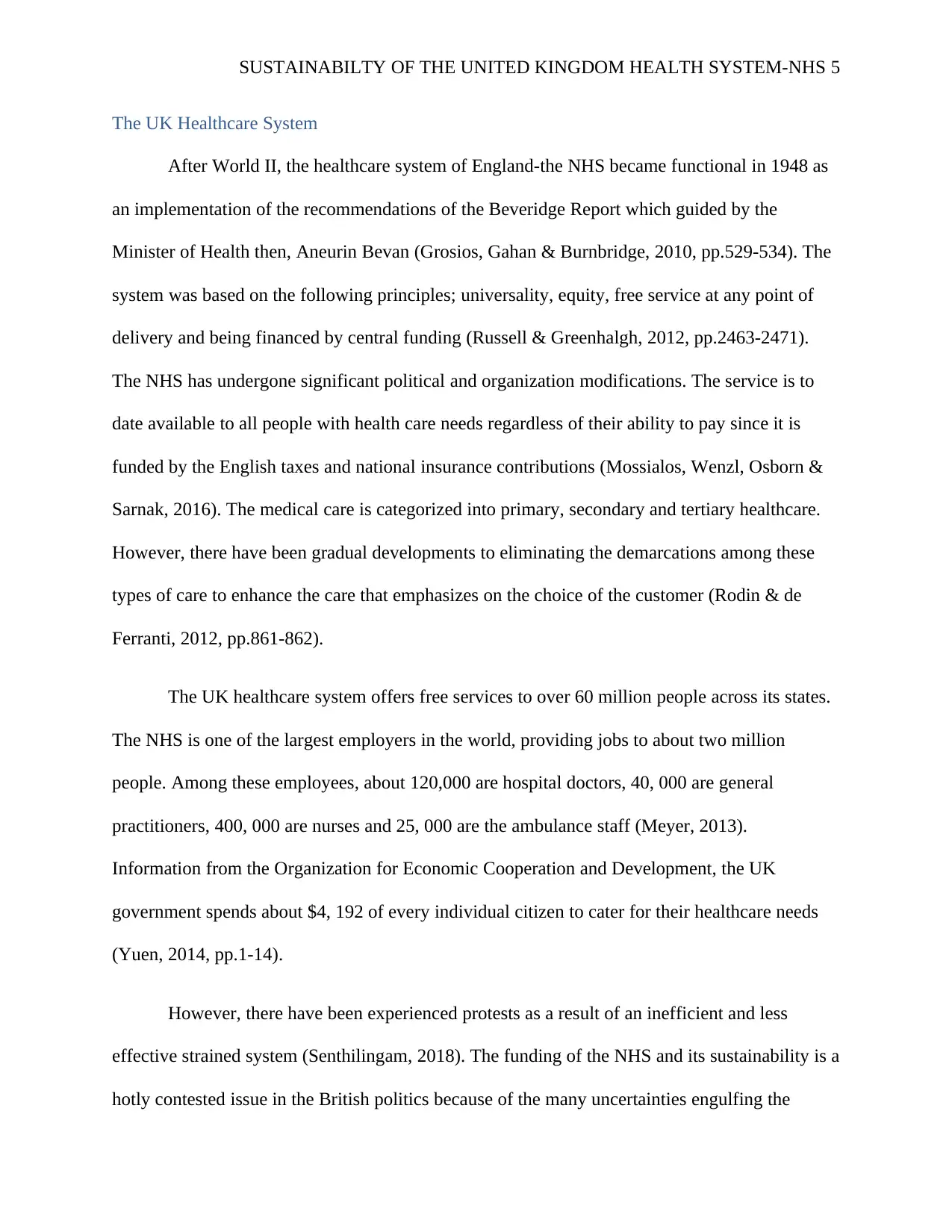
SUSTAINABILTY OF THE UNITED KINGDOM HEALTH SYSTEM-NHS 5
The UK Healthcare System
After World II, the healthcare system of England-the NHS became functional in 1948 as
an implementation of the recommendations of the Beveridge Report which guided by the
Minister of Health then, Aneurin Bevan (Grosios, Gahan & Burnbridge, 2010, pp.529-534). The
system was based on the following principles; universality, equity, free service at any point of
delivery and being financed by central funding (Russell & Greenhalgh, 2012, pp.2463-2471).
The NHS has undergone significant political and organization modifications. The service is to
date available to all people with health care needs regardless of their ability to pay since it is
funded by the English taxes and national insurance contributions (Mossialos, Wenzl, Osborn &
Sarnak, 2016). The medical care is categorized into primary, secondary and tertiary healthcare.
However, there have been gradual developments to eliminating the demarcations among these
types of care to enhance the care that emphasizes on the choice of the customer (Rodin & de
Ferranti, 2012, pp.861-862).
The UK healthcare system offers free services to over 60 million people across its states.
The NHS is one of the largest employers in the world, providing jobs to about two million
people. Among these employees, about 120,000 are hospital doctors, 40, 000 are general
practitioners, 400, 000 are nurses and 25, 000 are the ambulance staff (Meyer, 2013).
Information from the Organization for Economic Cooperation and Development, the UK
government spends about $4, 192 of every individual citizen to cater for their healthcare needs
(Yuen, 2014, pp.1-14).
However, there have been experienced protests as a result of an inefficient and less
effective strained system (Senthilingam, 2018). The funding of the NHS and its sustainability is a
hotly contested issue in the British politics because of the many uncertainties engulfing the
The UK Healthcare System
After World II, the healthcare system of England-the NHS became functional in 1948 as
an implementation of the recommendations of the Beveridge Report which guided by the
Minister of Health then, Aneurin Bevan (Grosios, Gahan & Burnbridge, 2010, pp.529-534). The
system was based on the following principles; universality, equity, free service at any point of
delivery and being financed by central funding (Russell & Greenhalgh, 2012, pp.2463-2471).
The NHS has undergone significant political and organization modifications. The service is to
date available to all people with health care needs regardless of their ability to pay since it is
funded by the English taxes and national insurance contributions (Mossialos, Wenzl, Osborn &
Sarnak, 2016). The medical care is categorized into primary, secondary and tertiary healthcare.
However, there have been gradual developments to eliminating the demarcations among these
types of care to enhance the care that emphasizes on the choice of the customer (Rodin & de
Ferranti, 2012, pp.861-862).
The UK healthcare system offers free services to over 60 million people across its states.
The NHS is one of the largest employers in the world, providing jobs to about two million
people. Among these employees, about 120,000 are hospital doctors, 40, 000 are general
practitioners, 400, 000 are nurses and 25, 000 are the ambulance staff (Meyer, 2013).
Information from the Organization for Economic Cooperation and Development, the UK
government spends about $4, 192 of every individual citizen to cater for their healthcare needs
(Yuen, 2014, pp.1-14).
However, there have been experienced protests as a result of an inefficient and less
effective strained system (Senthilingam, 2018). The funding of the NHS and its sustainability is a
hotly contested issue in the British politics because of the many uncertainties engulfing the
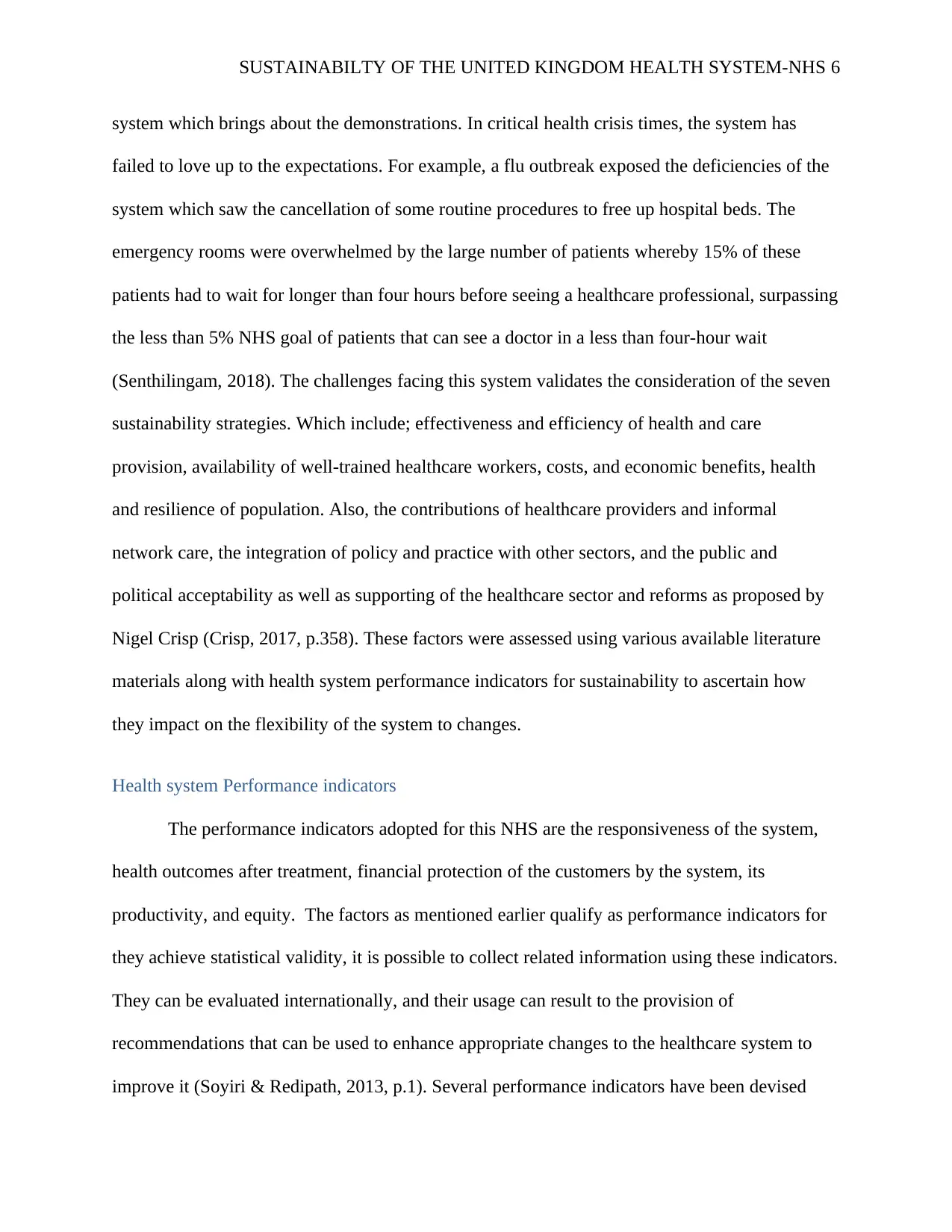
SUSTAINABILTY OF THE UNITED KINGDOM HEALTH SYSTEM-NHS 6
system which brings about the demonstrations. In critical health crisis times, the system has
failed to love up to the expectations. For example, a flu outbreak exposed the deficiencies of the
system which saw the cancellation of some routine procedures to free up hospital beds. The
emergency rooms were overwhelmed by the large number of patients whereby 15% of these
patients had to wait for longer than four hours before seeing a healthcare professional, surpassing
the less than 5% NHS goal of patients that can see a doctor in a less than four-hour wait
(Senthilingam, 2018). The challenges facing this system validates the consideration of the seven
sustainability strategies. Which include; effectiveness and efficiency of health and care
provision, availability of well-trained healthcare workers, costs, and economic benefits, health
and resilience of population. Also, the contributions of healthcare providers and informal
network care, the integration of policy and practice with other sectors, and the public and
political acceptability as well as supporting of the healthcare sector and reforms as proposed by
Nigel Crisp (Crisp, 2017, p.358). These factors were assessed using various available literature
materials along with health system performance indicators for sustainability to ascertain how
they impact on the flexibility of the system to changes.
Health system Performance indicators
The performance indicators adopted for this NHS are the responsiveness of the system,
health outcomes after treatment, financial protection of the customers by the system, its
productivity, and equity. The factors as mentioned earlier qualify as performance indicators for
they achieve statistical validity, it is possible to collect related information using these indicators.
They can be evaluated internationally, and their usage can result to the provision of
recommendations that can be used to enhance appropriate changes to the healthcare system to
improve it (Soyiri & Redipath, 2013, p.1). Several performance indicators have been devised
system which brings about the demonstrations. In critical health crisis times, the system has
failed to love up to the expectations. For example, a flu outbreak exposed the deficiencies of the
system which saw the cancellation of some routine procedures to free up hospital beds. The
emergency rooms were overwhelmed by the large number of patients whereby 15% of these
patients had to wait for longer than four hours before seeing a healthcare professional, surpassing
the less than 5% NHS goal of patients that can see a doctor in a less than four-hour wait
(Senthilingam, 2018). The challenges facing this system validates the consideration of the seven
sustainability strategies. Which include; effectiveness and efficiency of health and care
provision, availability of well-trained healthcare workers, costs, and economic benefits, health
and resilience of population. Also, the contributions of healthcare providers and informal
network care, the integration of policy and practice with other sectors, and the public and
political acceptability as well as supporting of the healthcare sector and reforms as proposed by
Nigel Crisp (Crisp, 2017, p.358). These factors were assessed using various available literature
materials along with health system performance indicators for sustainability to ascertain how
they impact on the flexibility of the system to changes.
Health system Performance indicators
The performance indicators adopted for this NHS are the responsiveness of the system,
health outcomes after treatment, financial protection of the customers by the system, its
productivity, and equity. The factors as mentioned earlier qualify as performance indicators for
they achieve statistical validity, it is possible to collect related information using these indicators.
They can be evaluated internationally, and their usage can result to the provision of
recommendations that can be used to enhance appropriate changes to the healthcare system to
improve it (Soyiri & Redipath, 2013, p.1). Several performance indicators have been devised
⊘ This is a preview!⊘
Do you want full access?
Subscribe today to unlock all pages.

Trusted by 1+ million students worldwide
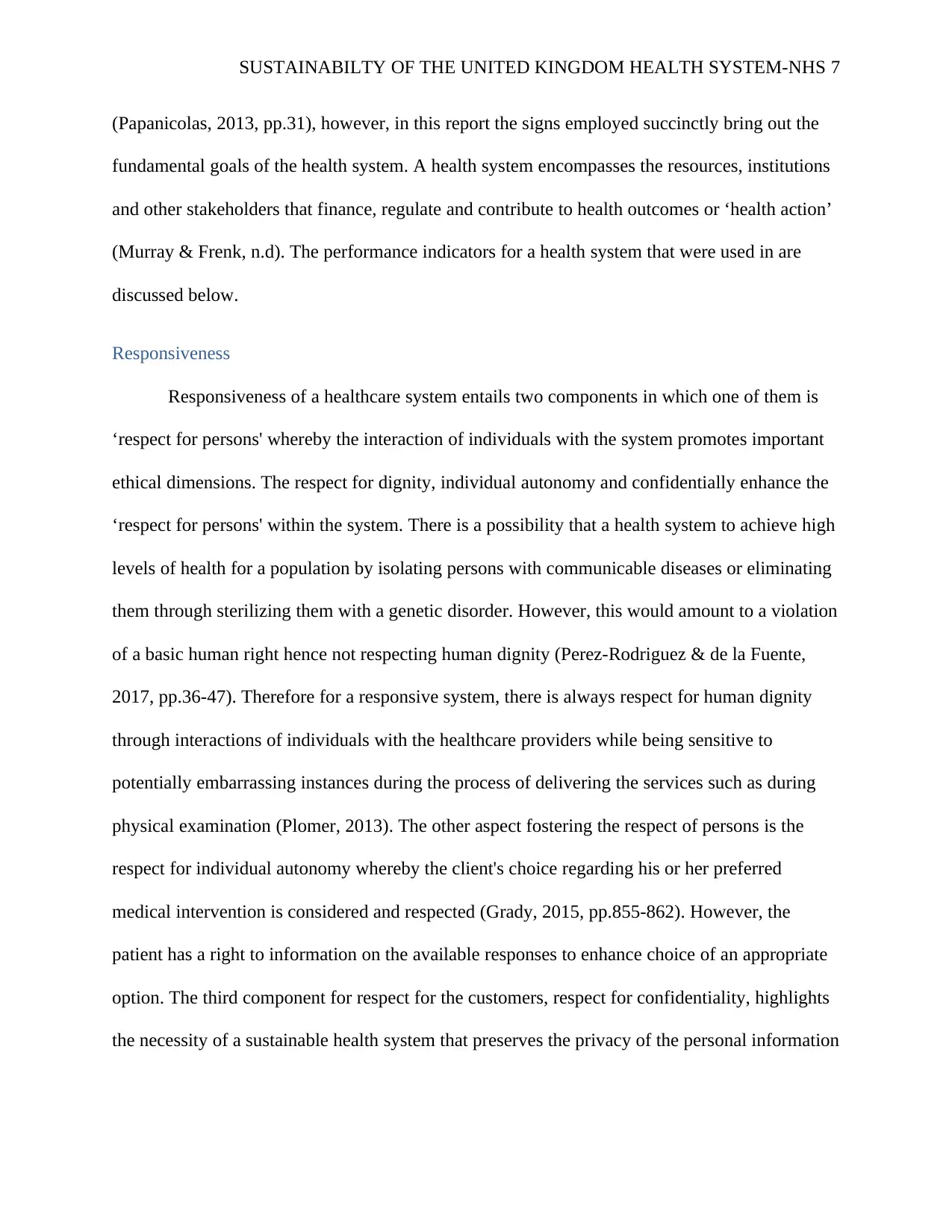
SUSTAINABILTY OF THE UNITED KINGDOM HEALTH SYSTEM-NHS 7
(Papanicolas, 2013, pp.31), however, in this report the signs employed succinctly bring out the
fundamental goals of the health system. A health system encompasses the resources, institutions
and other stakeholders that finance, regulate and contribute to health outcomes or ‘health action’
(Murray & Frenk, n.d). The performance indicators for a health system that were used in are
discussed below.
Responsiveness
Responsiveness of a healthcare system entails two components in which one of them is
‘respect for persons' whereby the interaction of individuals with the system promotes important
ethical dimensions. The respect for dignity, individual autonomy and confidentially enhance the
‘respect for persons' within the system. There is a possibility that a health system to achieve high
levels of health for a population by isolating persons with communicable diseases or eliminating
them through sterilizing them with a genetic disorder. However, this would amount to a violation
of a basic human right hence not respecting human dignity (Perez-Rodriguez & de la Fuente,
2017, pp.36-47). Therefore for a responsive system, there is always respect for human dignity
through interactions of individuals with the healthcare providers while being sensitive to
potentially embarrassing instances during the process of delivering the services such as during
physical examination (Plomer, 2013). The other aspect fostering the respect of persons is the
respect for individual autonomy whereby the client's choice regarding his or her preferred
medical intervention is considered and respected (Grady, 2015, pp.855-862). However, the
patient has a right to information on the available responses to enhance choice of an appropriate
option. The third component for respect for the customers, respect for confidentiality, highlights
the necessity of a sustainable health system that preserves the privacy of the personal information
(Papanicolas, 2013, pp.31), however, in this report the signs employed succinctly bring out the
fundamental goals of the health system. A health system encompasses the resources, institutions
and other stakeholders that finance, regulate and contribute to health outcomes or ‘health action’
(Murray & Frenk, n.d). The performance indicators for a health system that were used in are
discussed below.
Responsiveness
Responsiveness of a healthcare system entails two components in which one of them is
‘respect for persons' whereby the interaction of individuals with the system promotes important
ethical dimensions. The respect for dignity, individual autonomy and confidentially enhance the
‘respect for persons' within the system. There is a possibility that a health system to achieve high
levels of health for a population by isolating persons with communicable diseases or eliminating
them through sterilizing them with a genetic disorder. However, this would amount to a violation
of a basic human right hence not respecting human dignity (Perez-Rodriguez & de la Fuente,
2017, pp.36-47). Therefore for a responsive system, there is always respect for human dignity
through interactions of individuals with the healthcare providers while being sensitive to
potentially embarrassing instances during the process of delivering the services such as during
physical examination (Plomer, 2013). The other aspect fostering the respect of persons is the
respect for individual autonomy whereby the client's choice regarding his or her preferred
medical intervention is considered and respected (Grady, 2015, pp.855-862). However, the
patient has a right to information on the available responses to enhance choice of an appropriate
option. The third component for respect for the customers, respect for confidentiality, highlights
the necessity of a sustainable health system that preserves the privacy of the personal information
Paraphrase This Document
Need a fresh take? Get an instant paraphrase of this document with our AI Paraphraser
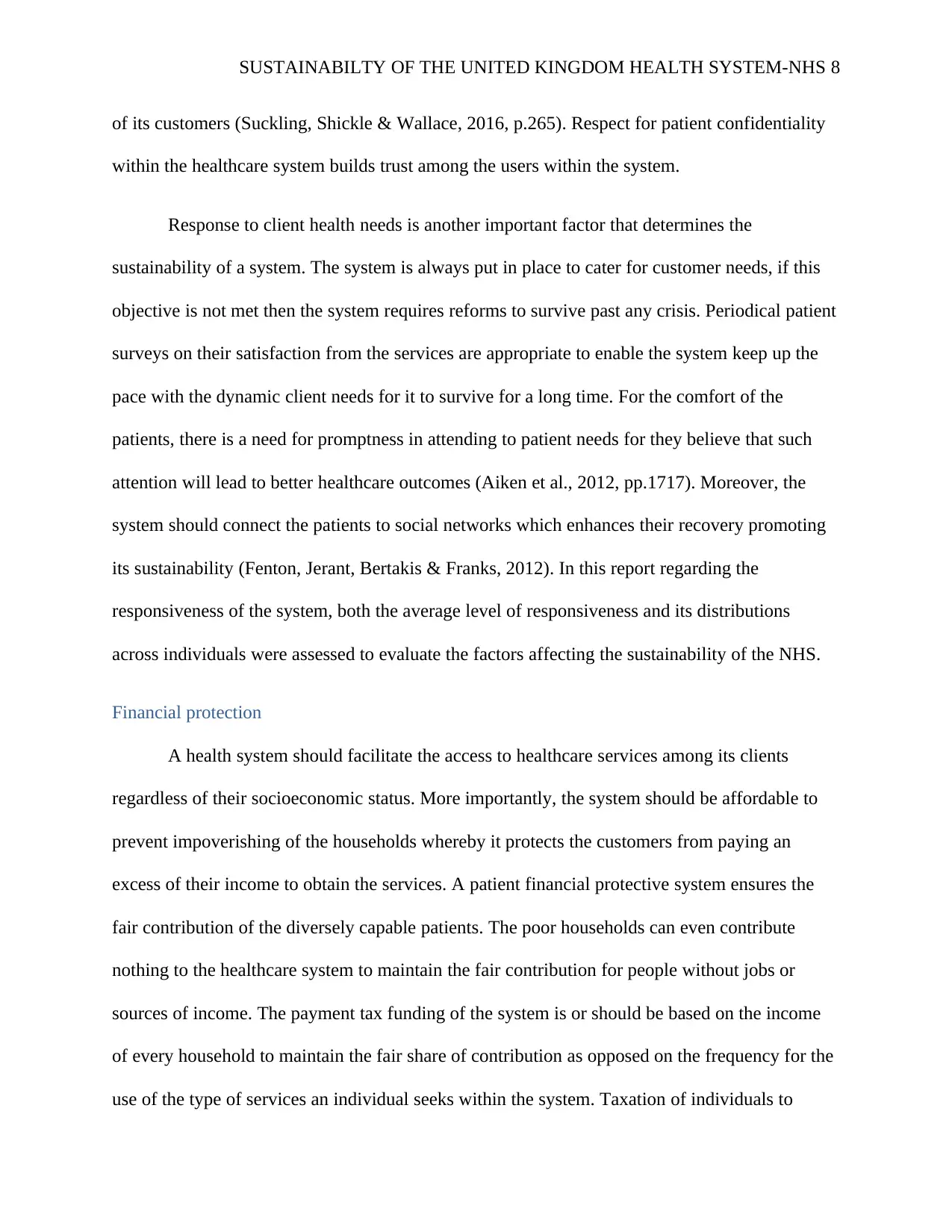
SUSTAINABILTY OF THE UNITED KINGDOM HEALTH SYSTEM-NHS 8
of its customers (Suckling, Shickle & Wallace, 2016, p.265). Respect for patient confidentiality
within the healthcare system builds trust among the users within the system.
Response to client health needs is another important factor that determines the
sustainability of a system. The system is always put in place to cater for customer needs, if this
objective is not met then the system requires reforms to survive past any crisis. Periodical patient
surveys on their satisfaction from the services are appropriate to enable the system keep up the
pace with the dynamic client needs for it to survive for a long time. For the comfort of the
patients, there is a need for promptness in attending to patient needs for they believe that such
attention will lead to better healthcare outcomes (Aiken et al., 2012, pp.1717). Moreover, the
system should connect the patients to social networks which enhances their recovery promoting
its sustainability (Fenton, Jerant, Bertakis & Franks, 2012). In this report regarding the
responsiveness of the system, both the average level of responsiveness and its distributions
across individuals were assessed to evaluate the factors affecting the sustainability of the NHS.
Financial protection
A health system should facilitate the access to healthcare services among its clients
regardless of their socioeconomic status. More importantly, the system should be affordable to
prevent impoverishing of the households whereby it protects the customers from paying an
excess of their income to obtain the services. A patient financial protective system ensures the
fair contribution of the diversely capable patients. The poor households can even contribute
nothing to the healthcare system to maintain the fair contribution for people without jobs or
sources of income. The payment tax funding of the system is or should be based on the income
of every household to maintain the fair share of contribution as opposed on the frequency for the
use of the type of services an individual seeks within the system. Taxation of individuals to
of its customers (Suckling, Shickle & Wallace, 2016, p.265). Respect for patient confidentiality
within the healthcare system builds trust among the users within the system.
Response to client health needs is another important factor that determines the
sustainability of a system. The system is always put in place to cater for customer needs, if this
objective is not met then the system requires reforms to survive past any crisis. Periodical patient
surveys on their satisfaction from the services are appropriate to enable the system keep up the
pace with the dynamic client needs for it to survive for a long time. For the comfort of the
patients, there is a need for promptness in attending to patient needs for they believe that such
attention will lead to better healthcare outcomes (Aiken et al., 2012, pp.1717). Moreover, the
system should connect the patients to social networks which enhances their recovery promoting
its sustainability (Fenton, Jerant, Bertakis & Franks, 2012). In this report regarding the
responsiveness of the system, both the average level of responsiveness and its distributions
across individuals were assessed to evaluate the factors affecting the sustainability of the NHS.
Financial protection
A health system should facilitate the access to healthcare services among its clients
regardless of their socioeconomic status. More importantly, the system should be affordable to
prevent impoverishing of the households whereby it protects the customers from paying an
excess of their income to obtain the services. A patient financial protective system ensures the
fair contribution of the diversely capable patients. The poor households can even contribute
nothing to the healthcare system to maintain the fair contribution for people without jobs or
sources of income. The payment tax funding of the system is or should be based on the income
of every household to maintain the fair share of contribution as opposed on the frequency for the
use of the type of services an individual seeks within the system. Taxation of individuals to
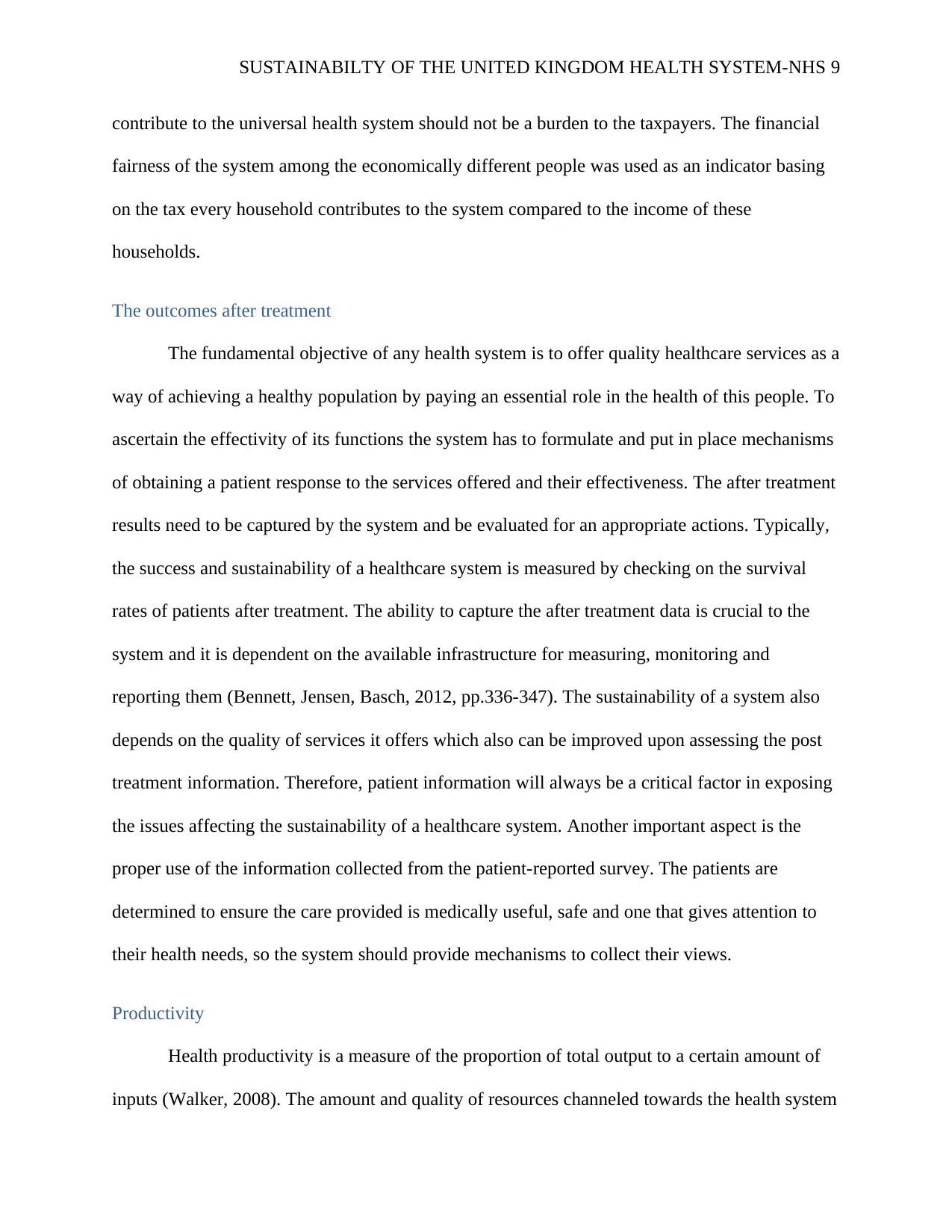
SUSTAINABILTY OF THE UNITED KINGDOM HEALTH SYSTEM-NHS 9
contribute to the universal health system should not be a burden to the taxpayers. The financial
fairness of the system among the economically different people was used as an indicator basing
on the tax every household contributes to the system compared to the income of these
households.
The outcomes after treatment
The fundamental objective of any health system is to offer quality healthcare services as a
way of achieving a healthy population by paying an essential role in the health of this people. To
ascertain the effectivity of its functions the system has to formulate and put in place mechanisms
of obtaining a patient response to the services offered and their effectiveness. The after treatment
results need to be captured by the system and be evaluated for an appropriate actions. Typically,
the success and sustainability of a healthcare system is measured by checking on the survival
rates of patients after treatment. The ability to capture the after treatment data is crucial to the
system and it is dependent on the available infrastructure for measuring, monitoring and
reporting them (Bennett, Jensen, Basch, 2012, pp.336-347). The sustainability of a system also
depends on the quality of services it offers which also can be improved upon assessing the post
treatment information. Therefore, patient information will always be a critical factor in exposing
the issues affecting the sustainability of a healthcare system. Another important aspect is the
proper use of the information collected from the patient-reported survey. The patients are
determined to ensure the care provided is medically useful, safe and one that gives attention to
their health needs, so the system should provide mechanisms to collect their views.
Productivity
Health productivity is a measure of the proportion of total output to a certain amount of
inputs (Walker, 2008). The amount and quality of resources channeled towards the health system
contribute to the universal health system should not be a burden to the taxpayers. The financial
fairness of the system among the economically different people was used as an indicator basing
on the tax every household contributes to the system compared to the income of these
households.
The outcomes after treatment
The fundamental objective of any health system is to offer quality healthcare services as a
way of achieving a healthy population by paying an essential role in the health of this people. To
ascertain the effectivity of its functions the system has to formulate and put in place mechanisms
of obtaining a patient response to the services offered and their effectiveness. The after treatment
results need to be captured by the system and be evaluated for an appropriate actions. Typically,
the success and sustainability of a healthcare system is measured by checking on the survival
rates of patients after treatment. The ability to capture the after treatment data is crucial to the
system and it is dependent on the available infrastructure for measuring, monitoring and
reporting them (Bennett, Jensen, Basch, 2012, pp.336-347). The sustainability of a system also
depends on the quality of services it offers which also can be improved upon assessing the post
treatment information. Therefore, patient information will always be a critical factor in exposing
the issues affecting the sustainability of a healthcare system. Another important aspect is the
proper use of the information collected from the patient-reported survey. The patients are
determined to ensure the care provided is medically useful, safe and one that gives attention to
their health needs, so the system should provide mechanisms to collect their views.
Productivity
Health productivity is a measure of the proportion of total output to a certain amount of
inputs (Walker, 2008). The amount and quality of resources channeled towards the health system
⊘ This is a preview!⊘
Do you want full access?
Subscribe today to unlock all pages.

Trusted by 1+ million students worldwide
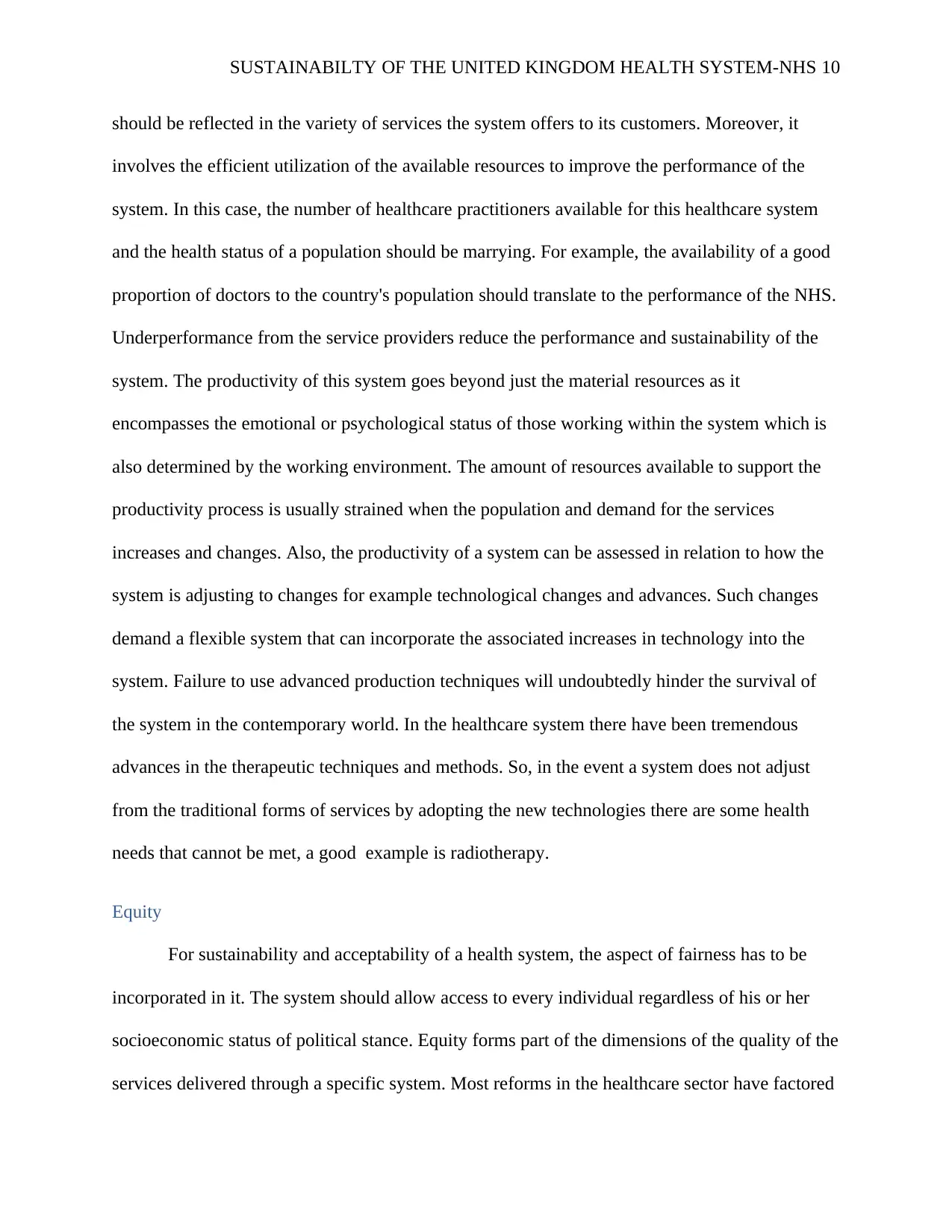
SUSTAINABILTY OF THE UNITED KINGDOM HEALTH SYSTEM-NHS 10
should be reflected in the variety of services the system offers to its customers. Moreover, it
involves the efficient utilization of the available resources to improve the performance of the
system. In this case, the number of healthcare practitioners available for this healthcare system
and the health status of a population should be marrying. For example, the availability of a good
proportion of doctors to the country's population should translate to the performance of the NHS.
Underperformance from the service providers reduce the performance and sustainability of the
system. The productivity of this system goes beyond just the material resources as it
encompasses the emotional or psychological status of those working within the system which is
also determined by the working environment. The amount of resources available to support the
productivity process is usually strained when the population and demand for the services
increases and changes. Also, the productivity of a system can be assessed in relation to how the
system is adjusting to changes for example technological changes and advances. Such changes
demand a flexible system that can incorporate the associated increases in technology into the
system. Failure to use advanced production techniques will undoubtedly hinder the survival of
the system in the contemporary world. In the healthcare system there have been tremendous
advances in the therapeutic techniques and methods. So, in the event a system does not adjust
from the traditional forms of services by adopting the new technologies there are some health
needs that cannot be met, a good example is radiotherapy.
Equity
For sustainability and acceptability of a health system, the aspect of fairness has to be
incorporated in it. The system should allow access to every individual regardless of his or her
socioeconomic status of political stance. Equity forms part of the dimensions of the quality of the
services delivered through a specific system. Most reforms in the healthcare sector have factored
should be reflected in the variety of services the system offers to its customers. Moreover, it
involves the efficient utilization of the available resources to improve the performance of the
system. In this case, the number of healthcare practitioners available for this healthcare system
and the health status of a population should be marrying. For example, the availability of a good
proportion of doctors to the country's population should translate to the performance of the NHS.
Underperformance from the service providers reduce the performance and sustainability of the
system. The productivity of this system goes beyond just the material resources as it
encompasses the emotional or psychological status of those working within the system which is
also determined by the working environment. The amount of resources available to support the
productivity process is usually strained when the population and demand for the services
increases and changes. Also, the productivity of a system can be assessed in relation to how the
system is adjusting to changes for example technological changes and advances. Such changes
demand a flexible system that can incorporate the associated increases in technology into the
system. Failure to use advanced production techniques will undoubtedly hinder the survival of
the system in the contemporary world. In the healthcare system there have been tremendous
advances in the therapeutic techniques and methods. So, in the event a system does not adjust
from the traditional forms of services by adopting the new technologies there are some health
needs that cannot be met, a good example is radiotherapy.
Equity
For sustainability and acceptability of a health system, the aspect of fairness has to be
incorporated in it. The system should allow access to every individual regardless of his or her
socioeconomic status of political stance. Equity forms part of the dimensions of the quality of the
services delivered through a specific system. Most reforms in the healthcare sector have factored
Paraphrase This Document
Need a fresh take? Get an instant paraphrase of this document with our AI Paraphraser
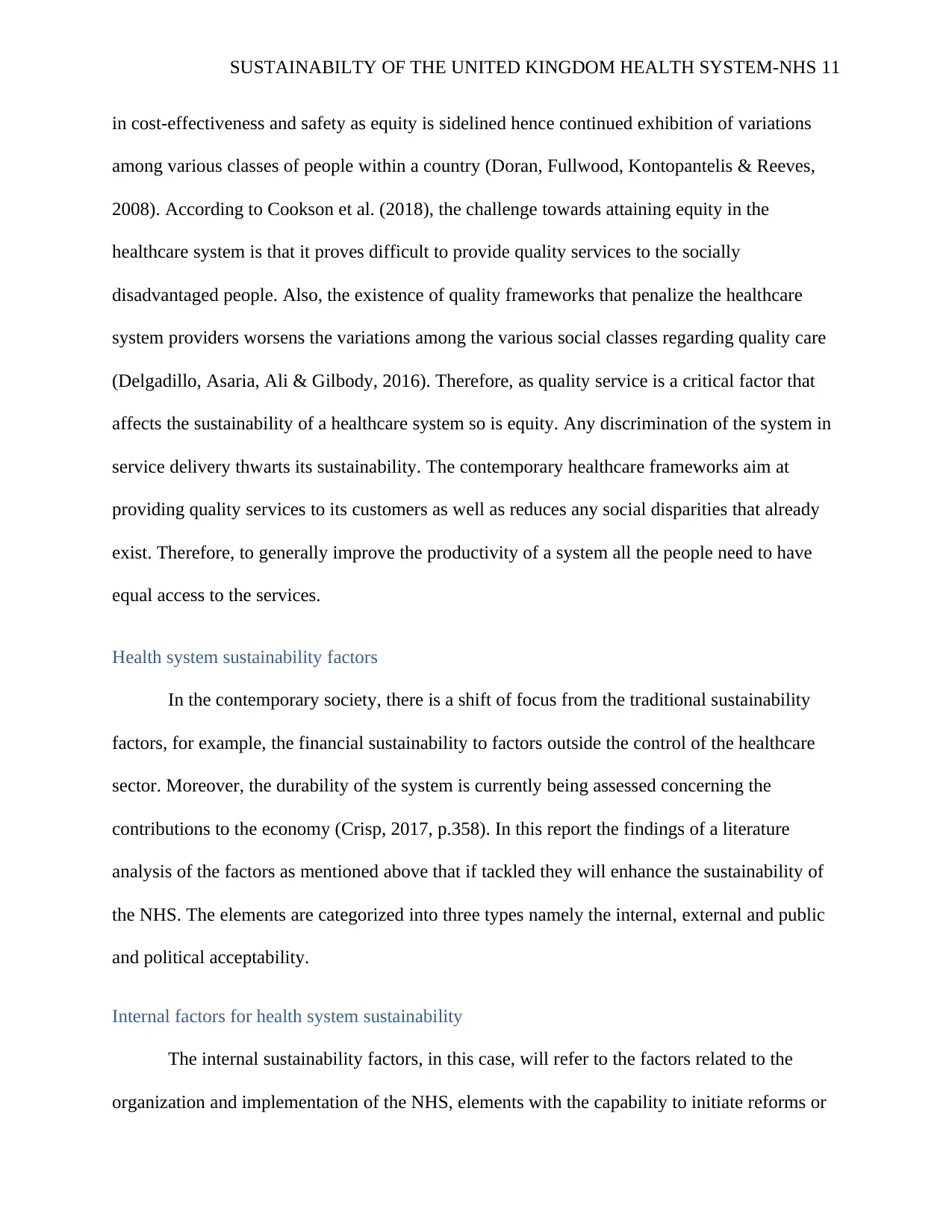
SUSTAINABILTY OF THE UNITED KINGDOM HEALTH SYSTEM-NHS 11
in cost-effectiveness and safety as equity is sidelined hence continued exhibition of variations
among various classes of people within a country (Doran, Fullwood, Kontopantelis & Reeves,
2008). According to Cookson et al. (2018), the challenge towards attaining equity in the
healthcare system is that it proves difficult to provide quality services to the socially
disadvantaged people. Also, the existence of quality frameworks that penalize the healthcare
system providers worsens the variations among the various social classes regarding quality care
(Delgadillo, Asaria, Ali & Gilbody, 2016). Therefore, as quality service is a critical factor that
affects the sustainability of a healthcare system so is equity. Any discrimination of the system in
service delivery thwarts its sustainability. The contemporary healthcare frameworks aim at
providing quality services to its customers as well as reduces any social disparities that already
exist. Therefore, to generally improve the productivity of a system all the people need to have
equal access to the services.
Health system sustainability factors
In the contemporary society, there is a shift of focus from the traditional sustainability
factors, for example, the financial sustainability to factors outside the control of the healthcare
sector. Moreover, the durability of the system is currently being assessed concerning the
contributions to the economy (Crisp, 2017, p.358). In this report the findings of a literature
analysis of the factors as mentioned above that if tackled they will enhance the sustainability of
the NHS. The elements are categorized into three types namely the internal, external and public
and political acceptability.
Internal factors for health system sustainability
The internal sustainability factors, in this case, will refer to the factors related to the
organization and implementation of the NHS, elements with the capability to initiate reforms or
in cost-effectiveness and safety as equity is sidelined hence continued exhibition of variations
among various classes of people within a country (Doran, Fullwood, Kontopantelis & Reeves,
2008). According to Cookson et al. (2018), the challenge towards attaining equity in the
healthcare system is that it proves difficult to provide quality services to the socially
disadvantaged people. Also, the existence of quality frameworks that penalize the healthcare
system providers worsens the variations among the various social classes regarding quality care
(Delgadillo, Asaria, Ali & Gilbody, 2016). Therefore, as quality service is a critical factor that
affects the sustainability of a healthcare system so is equity. Any discrimination of the system in
service delivery thwarts its sustainability. The contemporary healthcare frameworks aim at
providing quality services to its customers as well as reduces any social disparities that already
exist. Therefore, to generally improve the productivity of a system all the people need to have
equal access to the services.
Health system sustainability factors
In the contemporary society, there is a shift of focus from the traditional sustainability
factors, for example, the financial sustainability to factors outside the control of the healthcare
sector. Moreover, the durability of the system is currently being assessed concerning the
contributions to the economy (Crisp, 2017, p.358). In this report the findings of a literature
analysis of the factors as mentioned above that if tackled they will enhance the sustainability of
the NHS. The elements are categorized into three types namely the internal, external and public
and political acceptability.
Internal factors for health system sustainability
The internal sustainability factors, in this case, will refer to the factors related to the
organization and implementation of the NHS, elements with the capability to initiate reforms or
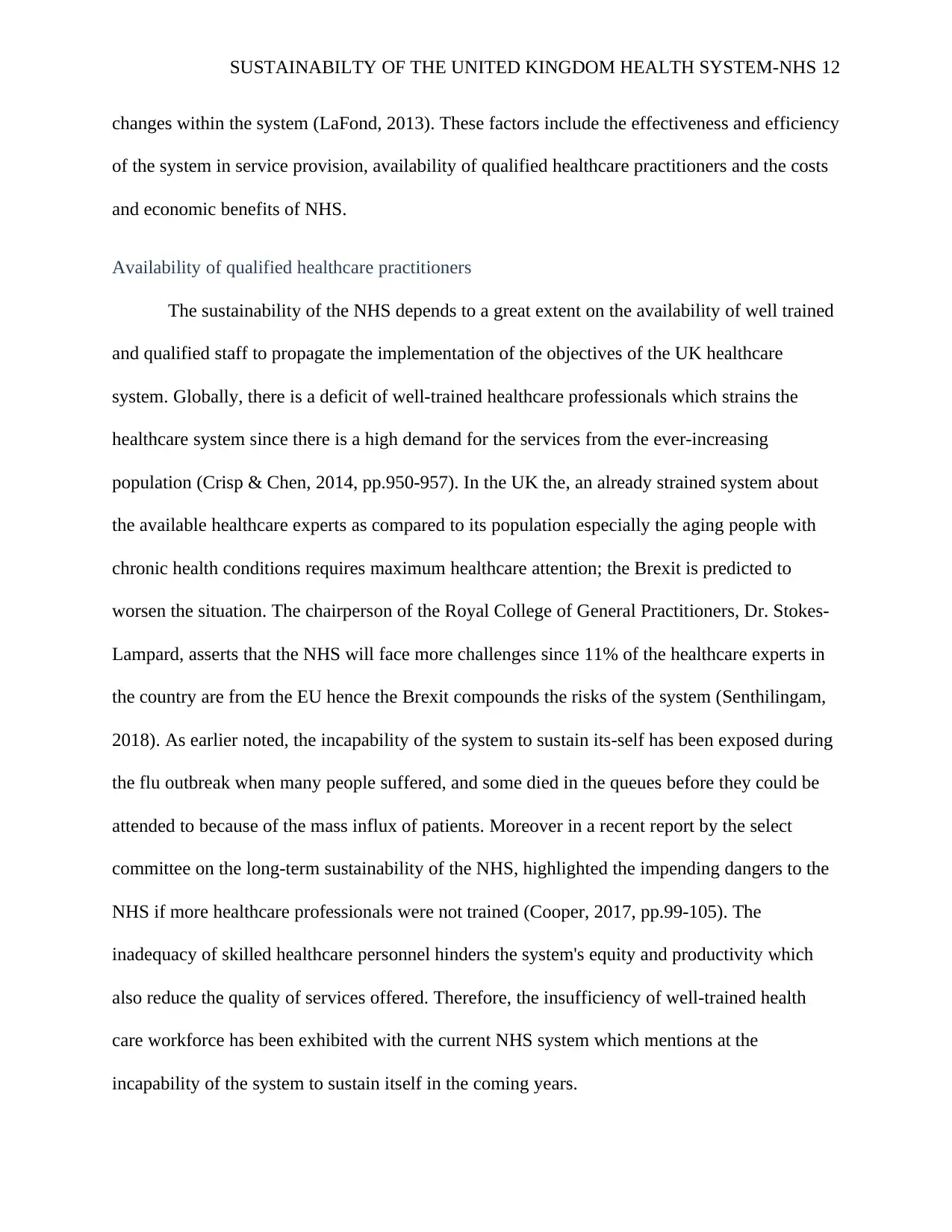
SUSTAINABILTY OF THE UNITED KINGDOM HEALTH SYSTEM-NHS 12
changes within the system (LaFond, 2013). These factors include the effectiveness and efficiency
of the system in service provision, availability of qualified healthcare practitioners and the costs
and economic benefits of NHS.
Availability of qualified healthcare practitioners
The sustainability of the NHS depends to a great extent on the availability of well trained
and qualified staff to propagate the implementation of the objectives of the UK healthcare
system. Globally, there is a deficit of well-trained healthcare professionals which strains the
healthcare system since there is a high demand for the services from the ever-increasing
population (Crisp & Chen, 2014, pp.950-957). In the UK the, an already strained system about
the available healthcare experts as compared to its population especially the aging people with
chronic health conditions requires maximum healthcare attention; the Brexit is predicted to
worsen the situation. The chairperson of the Royal College of General Practitioners, Dr. Stokes-
Lampard, asserts that the NHS will face more challenges since 11% of the healthcare experts in
the country are from the EU hence the Brexit compounds the risks of the system (Senthilingam,
2018). As earlier noted, the incapability of the system to sustain its-self has been exposed during
the flu outbreak when many people suffered, and some died in the queues before they could be
attended to because of the mass influx of patients. Moreover in a recent report by the select
committee on the long-term sustainability of the NHS, highlighted the impending dangers to the
NHS if more healthcare professionals were not trained (Cooper, 2017, pp.99-105). The
inadequacy of skilled healthcare personnel hinders the system's equity and productivity which
also reduce the quality of services offered. Therefore, the insufficiency of well-trained health
care workforce has been exhibited with the current NHS system which mentions at the
incapability of the system to sustain itself in the coming years.
changes within the system (LaFond, 2013). These factors include the effectiveness and efficiency
of the system in service provision, availability of qualified healthcare practitioners and the costs
and economic benefits of NHS.
Availability of qualified healthcare practitioners
The sustainability of the NHS depends to a great extent on the availability of well trained
and qualified staff to propagate the implementation of the objectives of the UK healthcare
system. Globally, there is a deficit of well-trained healthcare professionals which strains the
healthcare system since there is a high demand for the services from the ever-increasing
population (Crisp & Chen, 2014, pp.950-957). In the UK the, an already strained system about
the available healthcare experts as compared to its population especially the aging people with
chronic health conditions requires maximum healthcare attention; the Brexit is predicted to
worsen the situation. The chairperson of the Royal College of General Practitioners, Dr. Stokes-
Lampard, asserts that the NHS will face more challenges since 11% of the healthcare experts in
the country are from the EU hence the Brexit compounds the risks of the system (Senthilingam,
2018). As earlier noted, the incapability of the system to sustain its-self has been exposed during
the flu outbreak when many people suffered, and some died in the queues before they could be
attended to because of the mass influx of patients. Moreover in a recent report by the select
committee on the long-term sustainability of the NHS, highlighted the impending dangers to the
NHS if more healthcare professionals were not trained (Cooper, 2017, pp.99-105). The
inadequacy of skilled healthcare personnel hinders the system's equity and productivity which
also reduce the quality of services offered. Therefore, the insufficiency of well-trained health
care workforce has been exhibited with the current NHS system which mentions at the
incapability of the system to sustain itself in the coming years.
⊘ This is a preview!⊘
Do you want full access?
Subscribe today to unlock all pages.

Trusted by 1+ million students worldwide
1 out of 21
Related Documents
Your All-in-One AI-Powered Toolkit for Academic Success.
+13062052269
info@desklib.com
Available 24*7 on WhatsApp / Email
![[object Object]](/_next/static/media/star-bottom.7253800d.svg)
Unlock your academic potential
Copyright © 2020–2025 A2Z Services. All Rights Reserved. Developed and managed by ZUCOL.





